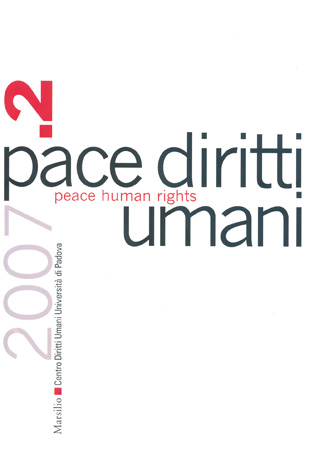Collections

Infrastruttura nazionale per i diritti umani: l’Italia è in ritardo
- Contained in
- Pace diritti umani - Peace Human Rights, 2/2007
- Pubblication type
- Articolo / Saggio
- Pages
- 7-18
- Language
- IT
National Infrastructure for Human Rights: Italy Is beyond Schedule
Antonio Papisca
Italy is not complying with the UN General Assembly Resolution of 1993 including the so-called Paris Principles on «National Institutions for Human Rights». Italy is still lacking a National Commission for Human Rights and a National Ombudsman. A Decree issued by the President of the Council of Ministers on 13 April 2007 has established a «Committee of Ministers for the orientation and strategic guidance in the field of the protection of human rights». A second Presidential Decree of 11 May 2007 has reorganised the already existing «Interministerial Committee for Human Rights». Both bodies have an intergovernmental composition, then they do not come under the category of «independent institutions» as recommended by the United Nations, the Council of Europe and the OSCE. The situation is embarassing, even paradoxical if we consider that innumerous human rights commissions and human rights (and peace and solidarity) councillors, as well as many ombudspersons are functioning at municipal, provincial and local level. This fertile reality of civil society, nurtured by thousands non-governamental organisations and volunteer groups, lacks the natural topical outcome. The author evaluate the content of the above mentioned Decrees, emphasizing the need for a correct division of labour. In particular, he stresses the importance of the Committee of Ministers in view of making more coherent and consistent the Italian policying in the field of human rights protection and promotion. He suggests some key items for a political agenda to be launched in coincidence with the 60th anniversary of the Universal Declaration of Human Rights. A prior commitment should be to set up genuine (independent) national institutions.

